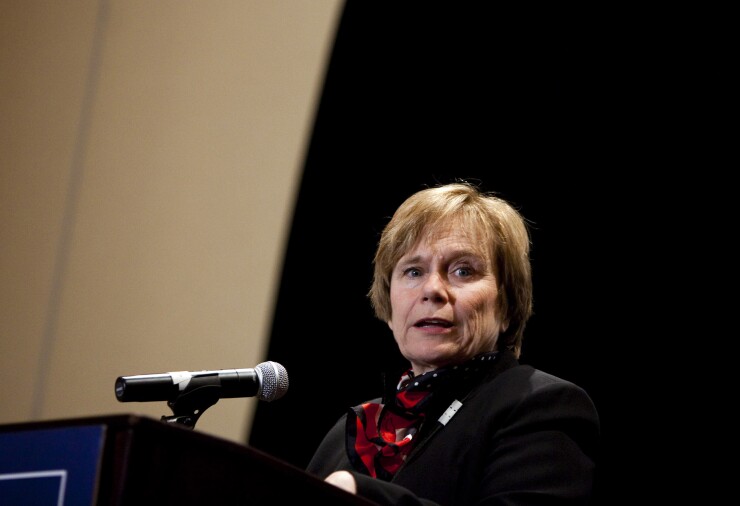Wells Fargo mostly won praise for its decision to elevate Elizabeth "Betsy" Duke, a former regulator and community banker, as chairman, with many describing her as a strong choice able to navigate the business and policy worlds.
"She knows when you get in the penalty box, what regulators look at and what Wells has to do," said Marty Mosby, a director of bank and equity strategies at Vining Sparks. "She will continue to address the issues and wrap it up in a way that says they will be strict and really focused. Her reputation at the top will create that tone."
Yet there were also outstanding questions about whether Duke is the right person to lead a culture change at a bank mired in
“This superficial change in leadership at Wells Fargo isn't enough to restore the trust and confidence of the American public," Rep. Maxine Waters, the top Democrat on the House Financial Services Committee, said in a press release. "While Elizabeth Duke is replacing Stephen Sanger as chairman, Ms. Duke was a member of the Wells Fargo board during numerous scandals and failed to rein in the bank's rampant consumer abuses."

Other industry sources privately agreed.
"What has she been doing for the past [two] years while Wells Fargo knowingly broke both ethics rules and the actual law?" said one industry source, who spoke on condition of anonymity. "For someone who professes to come from the cultural background of community banks, why did she just sit on the board and allow all of this wrongdoing to occur, even when whistleblowers came forward?"
Duke is set to succeed Sanger on Jan. 1 when he steps down as chairman. Two longtime directors also will retire by yearend and one new independent director will join the board.
Duke also has been on Wells' vice chairman since October 2016, a time when Wells
Observers said Duke faces a significant challenge ahead of her.
"This pressure culture has been around at Wells Fargo for a long, long time," said Nancy Bush, an analyst at NAB Research. "When you start turning over rocks, all kinds of things come out, and that's the thing that has really bothered people,"
Still, Bush called the choice of Duke a good move. "Does it solve everything? By no means," she said.
Wells CEO Tim Sloan said the board chose Duke in part for her regulatory experience. She was a governor at the Federal Reserve Board from 2008 to 2013.
“Betsy’s regulatory expertise has been invaluable to Wells Fargo, and I know that the combination of her banking and risk management experience will continue to serve the Board and the company well in her new role as Chair,” Sloan said.
Early this month, Wells acknowledged that it charged 800,000 customers for force-placed
"The scandals keep coming because they can't disclose them," Bush said. "They've known about them because they've been in discussions with regulators and they're having to do this drip, drip, trying to nail down the legal aspects and get settlements done."
Cliff Rossi, the founder of Chesapeake Risk Advisors and a former top risk manager at Citigroup, questioned what Duke has done on Wells board so far given that so many safeguards failed.
"This thing has lingered for so long, it's amazing that action wasn't taken more fundamentally. It's a step in the right direction but Wells needs people with experience in risk," said Rossi, who had a
He also questioned why Wells announced that Karen Peetz, the former president of BNY Mellon, who joined Wells board in February, would chair the risk committee, succeeding Enrique Hernandez Jr. on Sept. 1.
Investors gave Hernandez the
"Putting more business people on these risk committees is not the best direction," Rossi said. "The committees are there to ferret out risk taking that is beyond the company's appetite. Often if you're from the business side, you're going to be behaviorally inclined to have a favorable disposition toward management's risk-taking."
The bank said Tuesday that the board had elected Juan A. Pujadas, a retired principal of PricewaterhouseCoopers, as a new independent director, effective Sept. 1. Two longtime directors, Cynthia H. Milligan and Susan G. Swenson, will retire at the end of the year. Wells expects to name up to three additional independent directors by April.
This month, Wells expanded a review of phony accounts by three years. Wells expects to see a significant increase in the number of customers affected by its aggressive sales practices, and the amount it pays in litigation costs.
The Committee for Better Banks, a group that has supported the Wells employees who were fired under pressure to meet aggressive sales goals, struck a cautious tone.
"This is too little, too late," Erin Mahoney, the lead organizer of the group, said in a statement. "Wells Fargo has fired hundreds of frontline bank workers—yet waited a year to oust highly paid board members like Stephen Sanger who turned a blind eye to the crisis. We can only hope that new Chairman Elizabeth Duke enacts real institutional reform that protects consumers and gives workers a voice on the job. Only then can Wells Fargo truly win back the public’s trust.”





